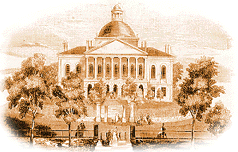A Brief History of Indian Legislative Representatives in the Maine Legislature
By S. Glenn Starbird, Jr.*, 1983
Updated by Donald Soctomah**, 1999
Addenda and footnotes added by Reference Librarians
![]() f all the fifty states in the Union, Maine is the only one that has Representatives in its Legislature for its Indian Tribes. This unique practice has an interesting history.
f all the fifty states in the Union, Maine is the only one that has Representatives in its Legislature for its Indian Tribes. This unique practice has an interesting history.
The earliest record of Representatives being sent from the Penobscots is in 1823 and of the Passamaquoddies in 1842. At that time there was no state law regarding election of Indian Delegates or Representatives to the Legislature and the choice of this person or persons was determined by tribal law or custom only. Massachusetts records show that the practice of the two tribes sending Representatives to the State Legislature was not new with the formation of the new State of Maine in 1820 but probably had been going on since before the Revolutionary War.
The differences between the Old and New Parties in the Penobscot Tribe in the 1830’s and 1840’s caused such confusion that these two parties signed an agreement in 1850 which provided, among other things, that “an election should be held every year to choose one member of the Tribe to represent the Tribe before the Legislature and the Governor and the Council.” This agreement governed the choice of Representative until the Legislature passed the so-called “Special Law” of 1866 1 which, with the Tribe’s agreement, finally settled the procedure of election for not only its Representative but the Governor and Lieutenant Governor as well.
A similar agreement setting forth the form of their Tribal Government was made between the two Passamaquoddy Reservations in what is known as the “Treaty of Peace of 1852.” The system of government established by this document has remained unchanged in its essential provisions ever since, although it was not enacted into State Law 2 until the Passamaquoddy Tribe petitioned the Legislature to do so in 1927. Among the Passamaquoddies, the Representative was to be elected alternately from each of the two Reservations.
A great deal more research must be done in regard to Indian Representation in the Maine Legislature, but our present meager knowledge of the subject shows that over the last half of the nineteenth century there was a gradual growth and development of the Indian representative’s status in the Legislative halls.
Only from the middle 1890’s was there a verbatim Legislative Record made, and not until 1907 is it provided with an index, but from that year on we can read clearly the record in session after session where the Indian Representatives 3 were seated, sometimes spoke, and were accorded other privileges.
This gradual movement in the status of Indian Representatives resulted in an effort during the 1939 Legislature 4 to place Indian Representatives on a nearly equal footing with the others. This effort failed, however, and the 1941 session passed legislation 5 that ousted the Indians entirely from the Hall of the House, their status being reduced to little better than state paid lobbyists. Since 1965, a gradual change for the better has occurred. Salaries and allowances have increased, and seating and speaking privileges were restored in 1975 6 , after a lapse of thirty-four years.
The closest analogy to Indian representation in the Maine Legislature now existing are probably the Federal Laws that allow the territories and the District of Columbia to seat Delegates in the Federal House of Representatives. Under Federal Law 7 and House Rule 8 a delegate can do anything a regular House Member can do except vote on pending legislation. [The delegate] can sit on a Committee and vote in Committee, [the delegate] receives the same salary and allowances, and for all practical purposes, except the House vote, does what any member of Congress can do.
Opinions by the Office of the Maine Attorney General 9 over the years would seem to indicate that Indian Representatives to the Maine House could have a position in the Maine Legislature very similar to delegates of the territories in Congress, under the law and House Rules as they now stand. At any rate, it is to be hoped that improvements in status will continue, for with the settlement of the Maine Indian Land Claims 10 in 1980, establishing an entirely new relationship with the State, the need for competent representation of the Indian Tribes in the Legislature is more vital than ever before.
In 1996, the Tribal Representatives sponsored a Native Bill 11 for the first time ever, and in 1999 a rule change 12 allowed the Passamaquoddy and Penobscot Representatives to co-sponsor any bill, statewide.
Currently the Wisconsin, New Brunswick, and New Zealand Legislatures are reviewing Passamaquoddy and Penobscot Representative status. Now is the time for Native Representatives to be given the vote 13.
NOTE: The above narrative of Indian Representation in the Legislature is based on information derived from the Legislative Record, Federal and State House Rules, State Department reports, Maine Public Laws, Resolves, Private and Special Laws, Federal Laws, newspaper articles, and other published accounts.
The following information was researched and added by Law Library staff.
ADDENDA:
ADD1.
The Houlton Band of Maliseet Indians was added to the Joint Rules 206 (3) and 316 on December 17, 2010, when the 125th Legislature adopted S.P.13 with the following changes. The first Maliseet representative was seated Jan. 4, 2012.
Rule 206 (3). Indian Representatives.
The member of the Penobscot Nation and , the member of the Passamaquoddy Tribe and, at the beginning of the Second Regular Session of the 125th Legislature, the member of the Houlton Band of Maliseet Indians elected to represent their people at each biennial Legislature may sponsor legislation specifically relating to Indians and Indian land claims, may offer floor amendments to this legislation, may cosponsor any other legislation and may sponsor and cosponsor expressions of legislative sentiment in the same manner as other members of the House.
Rule 316. Penobscot Nation , Passamaquoddy Tribe and Houlton Band of Maliseet Indians.
The member of the Penobscot Nation and , the member of the Passamaquoddy Tribe and, at the beginning of the Second Regular Session of the 125th Legislature, the member of the Houlton Band of Maliseet Indians elected to represent their people at the biennial session of the Legislature must be granted seats on the floor of the House of Representatives; be granted, by consent of the Speaker, the privilege of speaking on pending legislation; must be appointed to sit with joint standing committees as nonvoting members during the committees' deliberations; and be granted such other rights and privileges as may from time to time be voted by the House of Representatives. In reports from committees on which a tribal member serves, the position of the member must be noted and included.
ADD2.
On May 26, 2015 the Passamaquoddy Tribe and Penobscot Nation withdrew their legislative representatives amid growing tension between the tribes and State of Maine regarding mutual issues of respect and sovereignty. Disagreement over water quality standards, hunting and fishing rights, casino gambling, and tribal court authority, as well as Gov. LePage's recent rescinding of his 2011 executive order that had promoted cooperation between the state and tribes, contributed to the strained relationship. The Maliseets did not withdraw their representative.
ADD3.
The Penobscot Nation does not intend to fill its seat in the 128th session of Maine Legislature, choosing instead to select an ambassador to work with both state and federal governments, according to the Portland Press Herald, June 20, 2016.
ADD4.
On January 14, 2025, the Maine House of Representatives and Senate read and passed H.P. 129, Joint Order, to Amend Joint Rule 206 Regarding Tribal Representatives. This amended §3 of Joint Rule 206 to change the section heading from "Indian Representatives" to "Wabanaki Tribal Representatives."
FOOTNOTES:
FN1. Resolve 1866, ch. 36. Resolve in relation to the Penobscot Tribe of Indians. Information about the political parties of the Penobscot Nation, may have been taken from pp. 194-197 of Old John Neptune and other Maine Indian Shamans by Fannie Hardy Eckstorm. Southworth-Anthoensen Press, 1945.
FN2. Public Law 1927, ch. 148. An act relating to Indian Tribes.
FN3. Appendices included with the printed paper version of this article, as found in the Law Library's vertical file under the heading "Legislators-Tribal Reps", show some of this research regarding comments from the Legislative Record and lists of Tribal Representatives' names. An up-to-date list of Wabanaki Tribal Representatives to the Maine Legislature can be found here.
FN4. In 1939, L.D. 188 was redrafted with L.D. 879 in an effort to give Indian Representatives seating privileges and the same mileage and compensation as other representatives. The legislation passed in the Senate but failed twice in the House.
FN5. Public Law 1941, ch. 273. An act relating to Representation of Indian Tribes at the Legislature." Replaced language "to the Legislature" with "at the Legislature", in effect ousting the Tribal Representatives from the House chamber. Earlier in the same session attendance compensation for Indian Representatives was set at $200 by the enactment of Public Law 1941, ch. 84.
FN6. An Order sponsored by Rep. Judy Kany to add a new House Rule 55, granting Indian Representatives seating privileges, was passed by a vote of 107-40 in the House on January 22, 1975. Floor debate is printed on pages A59 and A65-69 of the Legislative Record for the House. Read the Order and House floor debate.
FN7. As example, see Title 48, Chapter 16 of the U.S. Code for laws regarding delegates to Congress from Guam, American Samoa and the Virgin Islands.
FN8 House Rule 525.
FN9. Me. Op. Atty. Gen. 99-1. The text of the opinion mentions prior letters and opinions which are linked to full-text where available.
FN10. Title 30, Chapter 601
FN11 HP 156 (117th Legislature, 1995) added a new Joint Rule 28-A (renumbered in 1997 as Joint Rule 206(3)) which provided for sponsorship by Indian Representatives of legislation relating to Indians and Indian land claims. The first such bill was LD 1787, An Act to Place Penobscot Land in Trust. The bill was sponsored by Rep. Bisulca of Penobscot Nation, amended by S-524 and enacted as PL 1995, ch. 601.
FN12. HP 356 (119th Legislature, 1999) amended Joint Rule 206(3) to allow co-sponsorship of legislation pertaining to any issue.
FN13.Extending the full right to vote in the Legislature and committees to Indian Representatives would violate the U.S. and Maine constitutions, according to Me. Op. Atty. Gen. 99-1.
*S. Glenn Starbird, Jr. was a member of the Maine House of Representatives from 1965-1971. According to his obituary, he went on to work for the U.S. Department of Indian Affairs and served as a genealogist and historian for the Penobscot Indian Nation from 1976-1995.
**Donald Soctomah served as Passamaquoddy Tribal Representative to the Maine Legislature from 1999-2002 and 2007-2010. He has also served as Tribal Historic Preservation Officer for the Passamaquoddy Nation of Maine.
Additional information
- Report of Committee to Address the Recognition of the Tribal Government Representatives of Maine's Sovereign Nations in the Legislature (2000) (appendices not included in online version)
- Me. Op. Atty. Gen. 99-1
- List of Wabanaki Tribal Representatives, 1823-
- Chronology of Wabanaki Tribal Representation
- Original 1983 Glenn S. Starbird, Jr. document upon which this webpage is based
1/21/2025 A-Z List



